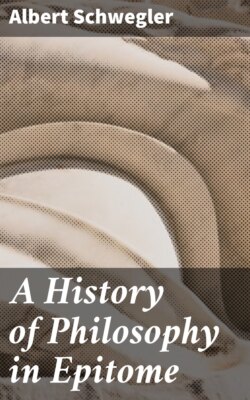Читать книгу A History of Philosophy in Epitome - Albert Schwegler - Страница 13
На сайте Литреса книга снята с продажи.
SECTION X.
ANAXAGORAS.
ОглавлениеTable of Contents
1. His Personal History.—Anaxagoras is said to have been born at Clazamena, about the year 500 BC; to have gone to Athens immediately, or soon after the Persian war, to have lived and taught there for a long time, and, finally, accused of irreverence to the gods, to have fled, and died at Lampsacus, at the age of 72. He it was who first planted philosophy at Athens, which from this time on became the centre of intellectual life in Greece. Through his personal relations to Pericles, Euripides, and other important men—among whom Themistocles and Thucydides should be named—he exerted a decisive influence upon the culture of the age. It was on account of this that the charge of defaming the gods was brought against him, doubtless by the political opponents of Pericles. Anaxagoras wrote a work “Concerning Nature” which in the time of Socrates was widely circulated.
2. His Relation to his Predecessors.—The system of Anaxagoras starts from the same point with his predecessors, and is simply another attempt at the solution of the same problem. Like Empedocles and the Atomists so did Anaxagoras most vehemently deny the becoming. “The becoming and departing,”—so runs one of his sayings—“the Greeks hold without foundation, for nothing can ever be said to become or depart; but, since existing things may be compounded together and again divided, we should name the becoming more correctly a combination, and the departing a separation.” From this view, that every thing arose by the mingling of different elements, and departed by the withdrawing of these elements, Anaxagoras, like his predecessors, was obliged to separate matter from the moving power. But though his point of starting was the same, yet was his direction essentially different from that of any previous philosopher. It was clear that neither Empedocles nor Democritus had satisfactorily apprehended the moving power. The mythical energies of love and hate of the one, or the unconscious necessity of the other, explained nothing, and least of all, the design of the becoming in nature. The conception of an activity which could thus work designedly, must, therefore, be brought into the conception of the moving power, and this Anaxagoras accomplished by setting up the idea of a world-forming intelligence (νοῦς), absolutely separated from all matter and working with design.
3. The Principle of the νοῦς.—Anaxagoras described this intelligence as free to dispose, unmingled with any thing, the ground of movement, but itself unmoved, every where active, and the most refined and pure of all things. Although these predicates rest partly upon a physical analogy, and do not exhibit purely the conception of immateriality, yet on the other hand does the attribute of thought and of a conscious acting with design admit no doubt to remain of the decided idealistic character of the Anaxagorean principle. Nevertheless, Anaxagoras went no farther than to enunciate his fundamental thought without attempting its complete application. The explanation of this is obvious from the reasons which first led him to adopt his principle. It was only the need of an original cause of motion, to which also might be attributed the capacity to work designedly, which had led him to the idea of an immaterial principle. His νοῦς, therefore, is almost nothing but a mover of matter, and in this function nearly all its activity is expended. Hence the universal complaint of the ancients, especially of Plato and Aristotle, respecting the mechanical character of his doctrine. In Plato’s Phædon Socrates relates that, in the hope of being directed beyond a simple occasioning, or mediate cause, he had turned to the book of Anaxagoras, but had found there only a mechanical instead of a truly teleological explanation of being. And as Plato so also does Aristotle find fault with Anaxagoras in that, while he admits mind as the ultimate ground of things, he yet resorts to it only as to a Deus ex machina for the explanation of phenomena, whose necessity he could not derive from the causality in nature. Anaxagoras, therefore, has rather postulated than proved mind as an energy above nature, and as the truth and actuality of natural being.
The further extension of his system, his doctrine concerning the homoiomeria (constituent elements of things), which according to him existed together originally in a chaotic condition until with their separation and parting the formation of the world began—can here only be mentioned.
4. Anaxagoras as the Close of the pre-Socratic Realism.—With the Anaxagorean principle of the νοῦς, i.e. with the acquisition of an absolutely immaterial principle, closes the realistic period of the old Grecian Philosophy. Anaxagoras combined together the principles of all his predecessors. The infinite matter of the Hylics is represented in his chaotic original mingling of things; the Eleatic pure being appears in the idea of the νοῦς; the Heraclitic power of becoming and the Empedoclean moving energies are both seen in the creating and arranging power of the eternal mind, while the Democritic atoms come to view in the homoiomeria. Anaxagoras is the closing point of an old and the beginning point of a new course of development—the latter through the setting up of his ideal principle, and the former through the defective and completely physical manner in which this principle was yet again applied.
